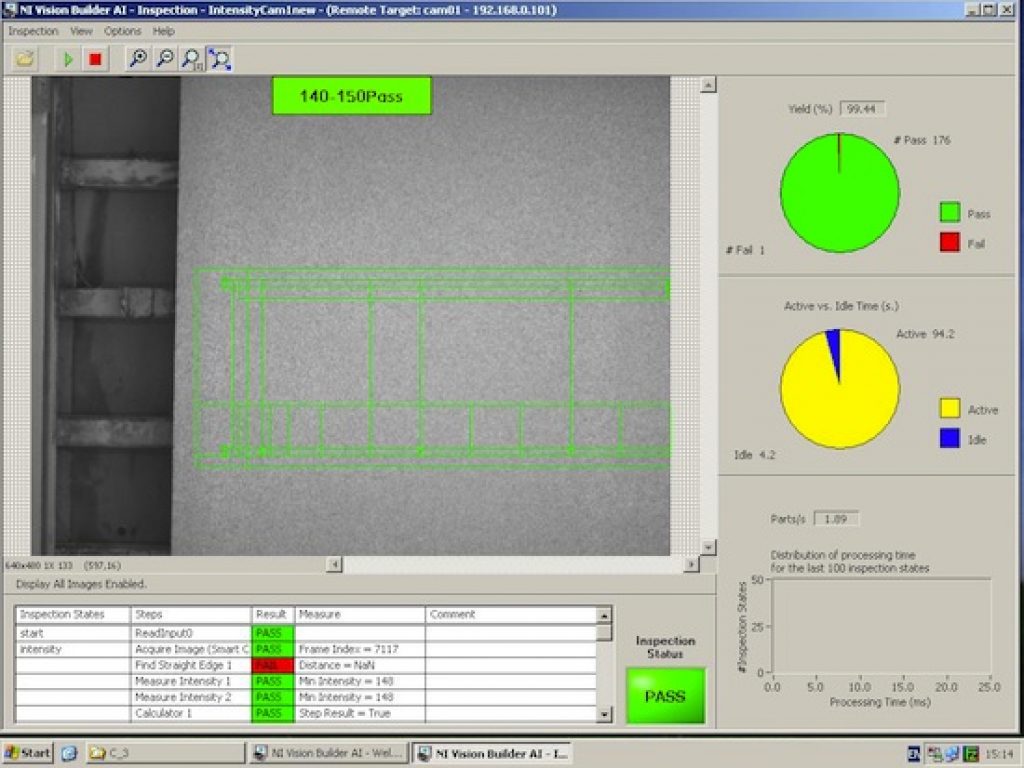"Obvious advantages of NI Smart Camera integration with the existing system include zero accidents or health issues, a savings of 150,000 THB (~$4,879 USD) from the labor overtime cost in H1 2012, no transportation cost from returned products, and improving quality control errors detected from 85 percent to 100 percent."
– Sarapong Kaney, Siam Riso Wood Products Co. Ltd.
The Challenge
Automating portions of particle board manufacturing to prevent exposure to harmful dust and chemicals and to improve the accuracy of production.
The Solution
Designing a room to cover part of the existing particle board manufacturing machine that contains three NI 1762 Smart Cameras programmed with custom algorithms to completely integrate with a green factory environment.
Machine vision technology has proven itself in many industrial sectors such as electronics, medicine, and automotive parts. However, those products are small. Because our finished products are large, they require individual identification during manufacturing.
Every day, we produce 10,000 units of particle board that require inspection by human operators, which is one of the biggest sources of errors. Even the most well-trained operators are prone to boredom. Operators are not needed for normal operation, and often panic when an unusual situation occurs. In addition, the working environment near the manufacturing machine is full of dust and chemical substances, which could seriously harm the health of operators without proper protection.
System Overview
We decided to replace human inspection with machine vision technology. We started by searching for technology with enough flexibility to integrate with our particle board manufacturing machine. Despite the large size of the machine and noisy environment, we needed highly accurate image processing.
We narrowed down our choices to National Instruments and other brands with effective image processing solutions. We determined that the NI Smart Camera is more flexible and can easily integrate with our existing system. Also, we can combine multiple algorithms with a triggering mechanism and external control using NI Vision Builder for Automated Inspection (AI) software.
With excellent support from National Instruments Thailand, we successfully modified the existing particle board manufacturing machine (Kvaerner Panel Systems GmbH from Germany) with three NI 1762 Smart Cameras at the surface polish process, which is the last process of the machine. Each NI Smart Camera covers approximately 1000 mm of the particle board in the area of 2510 mm width by 7430 mm length, and independently performs parallel processing to identify defects on each area.
Three NI Smart Cameras perform the defect detection in parallel, perform logic operations, and send the output to control the gate to extract the good and defective products to different cartons.
We tested multiple algorithms to ensure they accurately detect defects. The software design started with the state diagram feature, in which we defined the sequential mechanism and performed multiple case selections to ensure correct transitions to jump between each state. We then created input steps in the configuration interface to detect defects tested earlier.
We connected digital outputs from each NI Smart Camera to our customized circuit to interface with the existing controller, the S7 PLC from Siemens. The digital outputs summarized the logic operations to send and determine the control output for the decision to reject or to accept the finished products. The local area network for the NI Smart Cameras was integrated with the existing factory network, which all authorized managers easily logged in to for daily results viewing.
The system we developed can display the lot number, yield percentage, and quality control result for the operator who used the Inspection Interface from Vision Builder AI. Defective product images are also logged in the network drive running an FTP server along with statistics data for further process analysis.
Saving Time, Saving Money
We developed this vision system in just three months, including both hardware installation and software development. We can run this complete automated system 24 hours a day and seven days a week without an operator. Obvious advantages of the NI Smart Camera integration with the existing system include zero accidents or health issues, a savings of 150,000 THB (~$4,879 USD) from the labor overtime cost in H1 2012, no transportation cost from returned products, and improving quality control errors detected from 85 percent to 100 percent.
This successfully shows that the NI Smart Camera is customizable to different working environments and can deliver a variety of cost savings and quality improvements. We plan to perform a year-by-year comparison to apply NI vision to the other particle board manufacturing machines in the factory.
Author Information:
Sarapong Kaney
Siam Riso Wood Products Co. Ltd.
39/9 Moo 3, Tumbol Phunphin, Amphur Phunphin Suratthani
84130
Thailand
Tel: 66 7725 3370
Fax: 66 7725 3442
[email protected]


